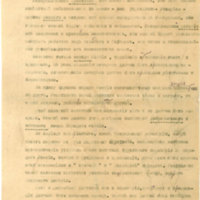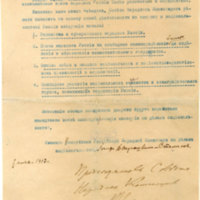Декларация прав народов России Declaration of the Rights of the Peoples of Russia
Transcription
<<RGASPI,f.2,op.1,d.24219,l.1-2>>
<<l.1>>
Декларация прав народов России
Октябрьская революция рабочих и крестьян началась под общим знаменем раскрепощения.
Раскрепощаются крестьяне от власти помещиков, ибо нет больше помещичьей собственности на землю - она упразднена. Раскрепощаются солдаты и матросы от власти самодержавных генералов, ибо генералы отныне будут выборными и сменяемыми. Раскрепощаются рабочие от капризов и произвола капиталистов, ибо отныне будет установлен контроль рабочих над заводами и фабриками. Все живое и жизнеспособное раскрепощается от ненавистных оков.
Остаются только народы России, терпевшие и терпящие гнет и произвол, к раскрепощению которых должно быть преступлено немедленно, освобождение которых должно быть проведено решительно и бесповоротно.
В эпоху царизма народы России систематически натравливались друг на друга. Результаты такой политики известны: резня и погромы, с одной стороны, рабство народов - с другой.
Этой позорной политике натравливания нет и не должно быть возврата. Отныне она должна быть заменена политикой добровольного и честного союза народов России.
В период империализма, после февральской революции, когда власть перешла в руки кадетской буржуазии, неприкрытая политика натравливания уступила место политике трусливого недоверия к народам России, политике придирок и провокации, прикрывающейся словесными заявлениями о "свободе" и "равенстве" народов. Результаты такой политики известны: усиление национальной вражды, подрыв взаимного доверия.
Этой недостойной политике лжи и недоверия, придирок и провокации должен быть положен конец. Отныне она должна быть заменена открытой и честной политикой, ведущей к полному взаимному доверию народов России.
Только в результате такого доверия может сложиться честный и прочный союз народов России.
Только в результате такого союза могут быть спаяны рабочие и крестьяне народов России в одну революционную силу, способную устоять против всяких покушений со стороны империалистско-аннексионистской
<<l.2>>
буржуазии.
Исходя из этих положений, первый Съезд Советов в июле этого года провозгласил право народов России на свободное самоуправление.
Второй съезд Советов в октябре этого года подтвердил это неотъемлемое право народов России более решительно и определенно.
Исполняя волю этих съездов, Совет Народных Комиссаров решил положить в основу своей деятельности по вопросу о национальностях России следующие начала:
1) Равенство и суверенность народов России.
2) Право народов России на свободное самоопределение вплоть до отделения и образования самостоятельного государства.
3) Отмена всех и всяких национальных и национально - религиозных привилегий и ограничений.
4) Свободное развитие национальных меньшинств и этнографических групп, населяющих территорию России.
Вытекающие отсюда конкретные декреты будут выработаны немедленно после конструирования Комиссии по делам национальностей.
Именем Республики Российской
Народный комиссар по делам национальностей
Иосиф Джугашвили Сталин
Председатель Совета Народных Комиссаров В. Ульянов (Ленин)
2 ноября 1917 г.
Translation
<<RGASPI,f.2,op.1,d.24219,l.1-2>>
<<l.1>>
Declaration of the Rights of the Peoples of Russia
The October revolution of the workmen and peasants began under the common banner of emancipation. The peasants are being emancipated from the power of the landowners, for there is no longer the landowner's property right in the land — it has been abolished. The soldiers and sailors are being emancipated from the power of autocratic generals, for generals will henceforth be elective and subject to recall. The workingmen are being emancipated from the whims and arbitrary will of the capitalists, for henceforth there will be established the control of the workers over mills and factories. Everything living and capable of life is being emancipated from the hateful shackles. There remain only the peoples of Russia, who have suffered and are suffering oppression and arbitrariness, and whose emancipation must immediately be begun, whose liberation must be effected resolutely and definitely.
During the period of czarism the peoples of Russia were systematically incited against one another. The results of such a policy are known; massa¬cres and pogroms on the one hand, slavery of peoples on the other.
There can be and there must be no return to this disgraceful policy of instigation. Henceforth the policy of a voluntary and honest union of the peoples of Russia must be substituted.
In the period of imperialism; after the February revolution, when the power was transferred to the hands of the Cadet bourgeoisie, the naked policy of instigation gave way to one of cowardly distrust of the peoples of Russia, to a policy of fault-finding and provocation, of "freedom" and "equality" of peoples. The results of such a policy are known; the growth of national enmity, the impairment of mutual trust.
An end must be put to this unworthy policy of falsehood and distrust, of fault-finding and provocation. Henceforth it must be replaced by an open and honest policy which leads to complete mutual trust of the people of Russia. Only as the result of such a trust can there be formed an honest and lasting union of the peoples of Russia. Only as the result of such a union can the workmen and peasants of the peoples of Russia be cemented into one revolutionary force able to resist all attempts on the part of the imperialist-annexationist
<<l.2>>
bourgeoisie.
Starting with these assumptions, the first Congress of Soviets, in June of this year, proclaimed the right of the peoples of Russia to free self-determination.
The second Congress of Soviets, in October of this year, reaffirmed this inalienable right of the peoples of Russia more decisively and definitely.
The united will of this Congresses, The Councils of the People's Commissars, resolved to base of their activity upon the question of the nationalties of Russia, as expressed in the following principles:
1. The equality and sovereignty of the peoples of Russia.
2. The right of the peoples of Russia to free self-determination, even to the point of separation and the formation of an independent state.
3. The abolition of any and all national and national-religious privileges and disabilities.
4. The free development of national minorities and ethnographic groups inhabiting the territory of Russia.
The concrete decrees that follow from these principles will be immedieatly elaborated after the setting up of a Commission of Nationality Affairs.
In the name of the Russian Republic,
People's Commissar on Nationality Affairs,
Josef Dzhugashvili (Stalin).
Chairman of the Council of People's Commissars,
V. Ulianov (Lenin).
2 November 1918


Comments
Translation courtesy marxists.org
Images: http://rusarchives.ru/projects/statehood/